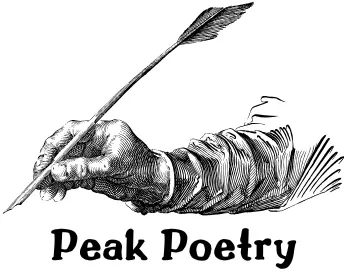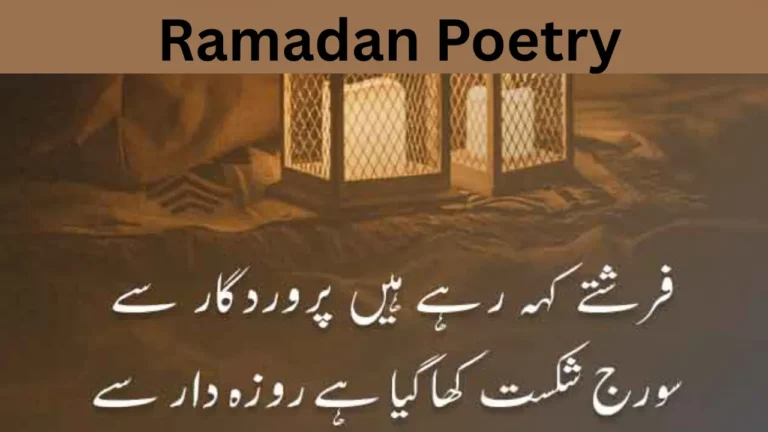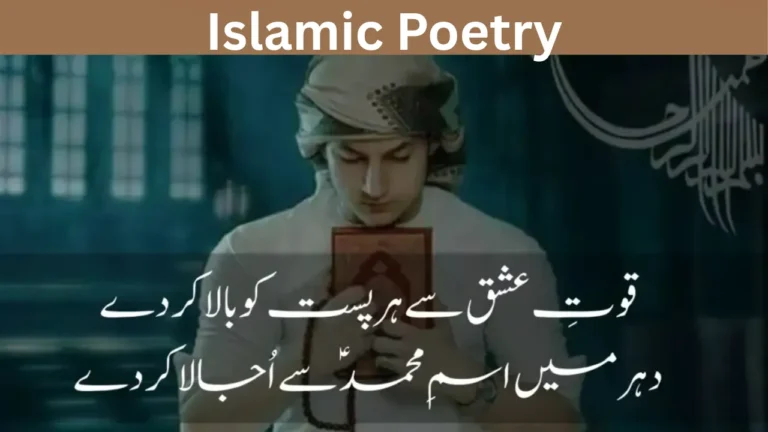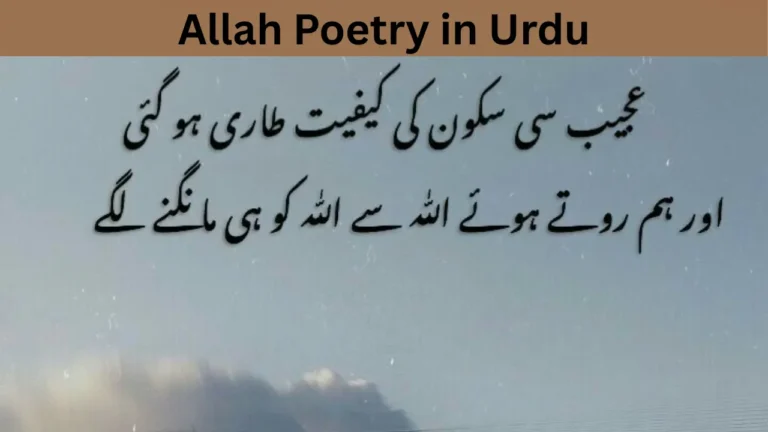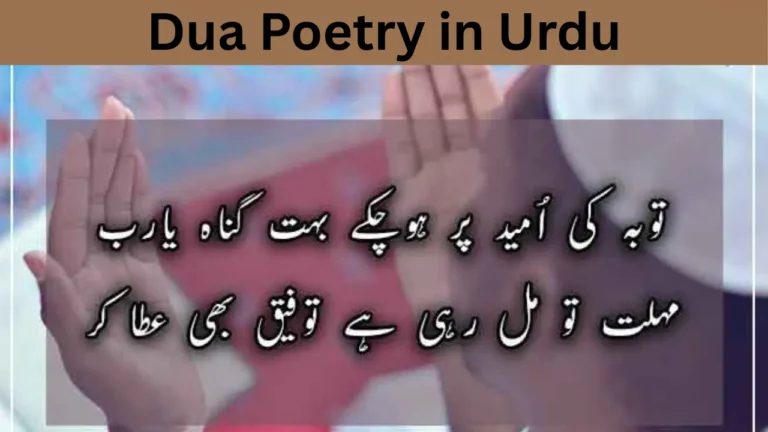Imam Hussain Poetry: Soul-Stirring Lines on Karbala
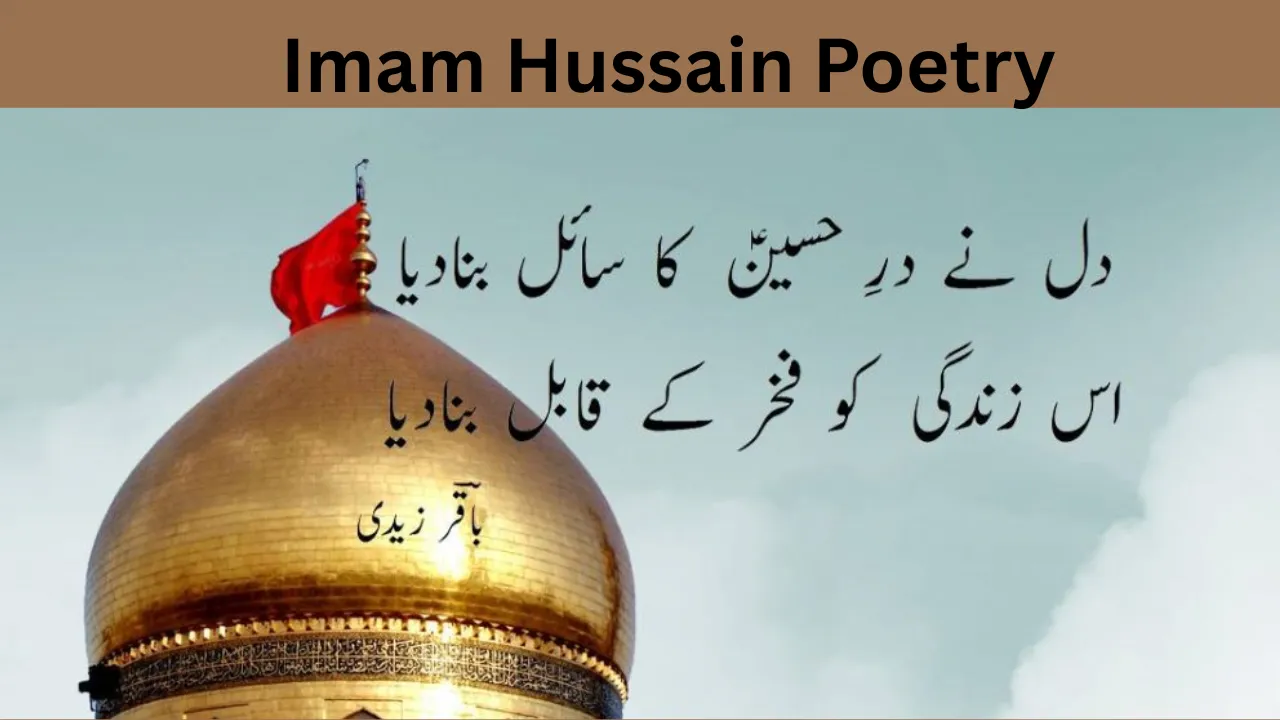
Imam Hussain poetry holds a deep and emotional place in Islamic literature. It tells the story of sacrifice, bravery, and unshakable faith. These poems do not only reflect sorrow but also inspire hope and strength. In many cultures, especially among Muslims, this poetry is recited during Muharram to honor the martyrdom of Imam Hussain (RA) and his companions.
The connection people feel with Imam Hussain’s story through poetry is timeless and powerful. This poetry is more than just words—it is a reminder of standing for justice, even when the odds are against you.
Also Read: Sister Poetry in Urdu: Celebrating the Bond of Siblings
What is Imam Hussain Poetry?
Imam Hussain poetry refers to poems written to remember the bravery, sacrifice, and faith of Imam Hussain, the grandson of Prophet Muhammad (PBUH). These poems are often recited during Majlis (gatherings), Ashura, and the first ten days of Muharram. They serve to remind people of the pain and hardship faced in the Battle of Karbala.
These poems come in various styles like Noha, Marsiya, Manqabat, and Qasida. Each has a unique tone—some are mournful, while others are full of praise. What they all share is deep emotion and spiritual meaning.
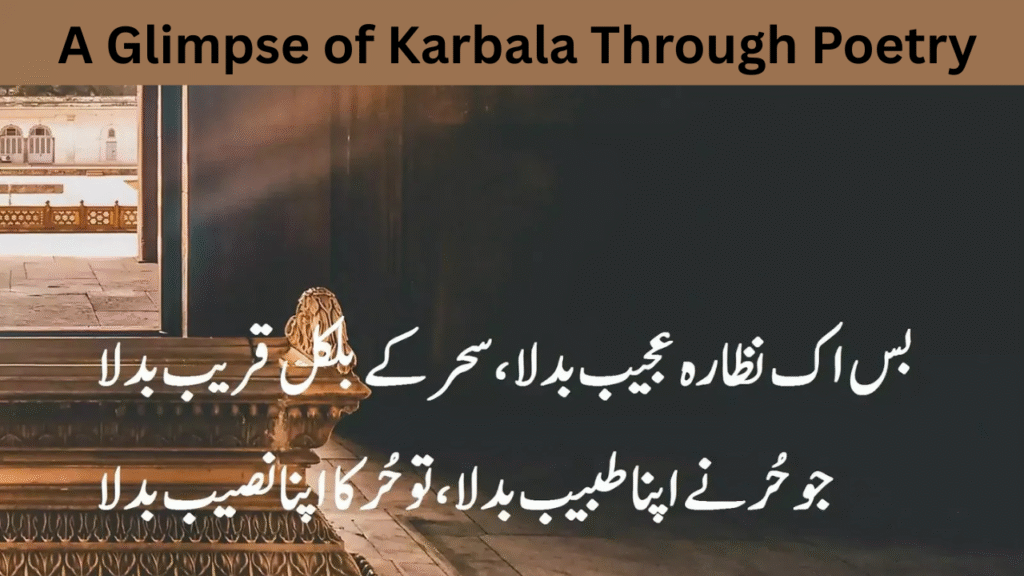
A Glimpse of Karbala Through Poetry
The imam hussain poetry beautifully captures the pain of Karbala. One can feel the thirst, the courage, and the spiritual strength of the martyrs.
English Poetry:
“In burning sands and skies so wide,
He faced death with no fear to hide.
For truth he stood, for faith he died,
With love for God, he was crucified.”
Urdu Poetry:
“Na tha koi paani, na tha koi saaya,
Hussain tha akela, magar jhukaya na maaya.”
These verses remind us of how Imam Hussain stood strong even without food, water, or shelter.
Why Imam Hussain Poetry Is Important?
This poetry is important because it keeps the message of Karbala alive. It reminds Muslims of the value of truth, faith, and standing against injustice. Even today, people find strength in the lessons from Imam Hussain’s life through poetry.
Poetry helps express what many find hard to say in normal words. When someone listens to imam hussain poetry, they often feel sadness, courage, and love all at once. These poems bring people closer to their faith and make them reflect on their values.
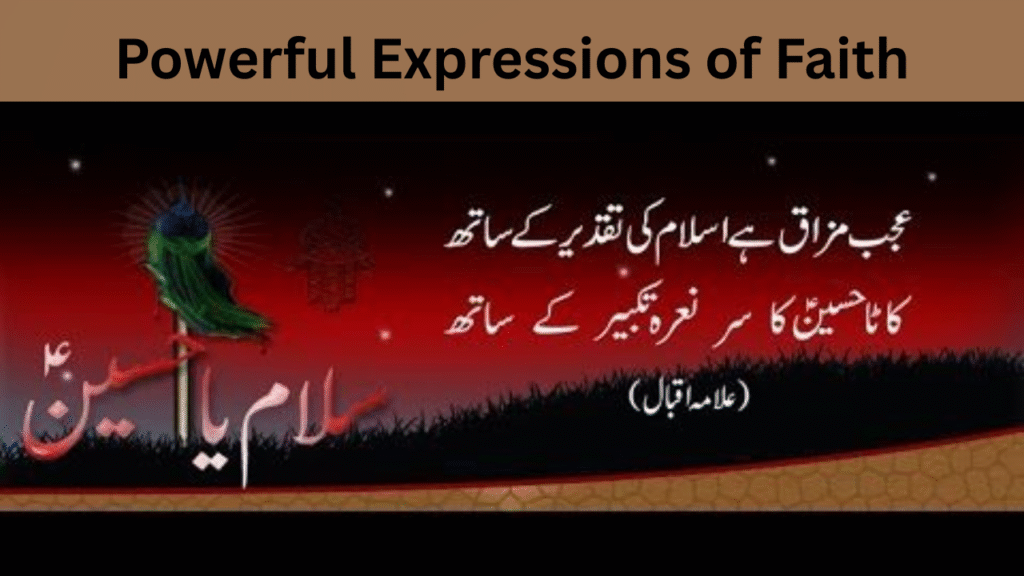
Powerful Expressions of Faith
Poets across the world have dedicated their lives to imam hussain poetry. Their words echo across generations. Here are a few more examples:
English Poetry:
“They killed the body, not the soul,
His sacrifice made Islam whole.
The son of Ali, the pride of light,
Still shines in hearts like stars at night.”
Urdu Poetry:
“Shaam ke andheron mein roshan tha jo noor,
Hussain ka tha wo chiraagh, jala har zarra zaroor.”
These lines reflect how Imam Hussain’s name continues to shine, even in the darkest times.
Also Read: Bewafa Dost Poetry in Urdu: Heartfelt Lines on Broken Friendship
Different Types of Imam Hussain Poetry
There are different forms of poetry written for Imam Hussain. Each type has a purpose. Some are written to praise him, others to mourn his loss. Below is a simple table to understand the key types:
| Type of Poetry | Description |
|---|---|
| Noha | Sad poems about the events of Karbala, often recited in gatherings |
| Marsiya | Poems that describe the tragedy in great detail and honor the martyrs |
| Manqabat | Praising poems written to glorify Imam Hussain and his family |
| Qasida | Classical poetic form, used to show love and devotion |
Each form plays a role in keeping the memory of Karbala alive in people’s hearts. Whether in Pakistan, India, Iran, or Iraq, these poems are central to Muharram rituals.
Impact of Imam Hussain Poetry on Modern Readers
Even in today’s digital age, imam hussain poetry is more alive than ever. It is shared on social media, spoken in gatherings, and printed in books. Videos of young children reciting these poems go viral every year.
The betrayal of Hussain by the people of Kufa is one of the most repeated themes in these poems. Still, his courage and purity inspire hearts across generations.
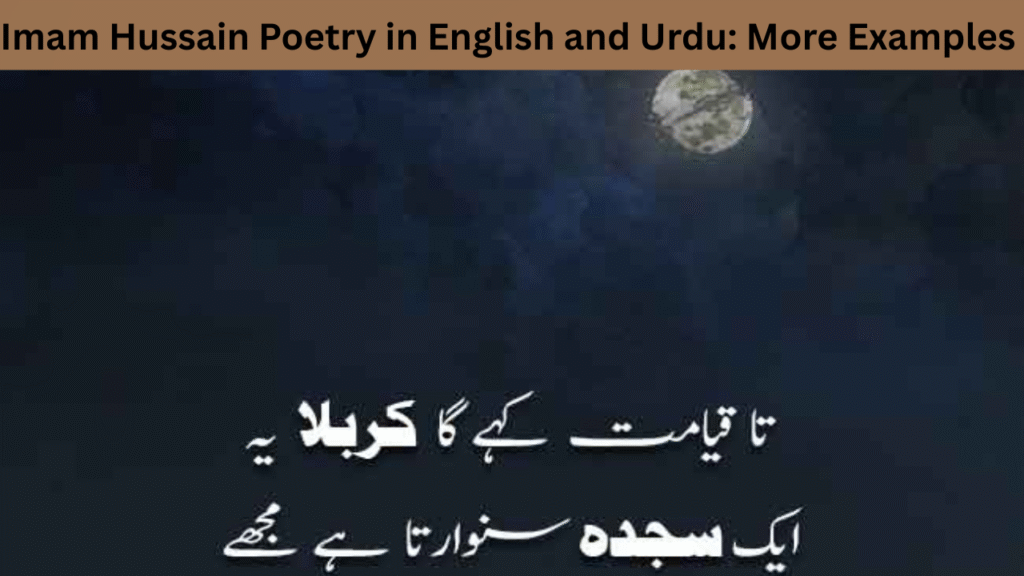
Imam Hussain Poetry in English and Urdu: More Examples
Here are more examples to show the richness of imam hussain poetry in both languages:
English Poetry:
“The sword was raised, but he did not bend,
He knew his path would never end.
His blood became a river bright,
That washed the world in sacred light.”
“A child lay thirsty by the stream,
Yet no one dared fulfill the dream.
But Hussain walked the path alone,
With faith as sharp as any stone.”
“The sky turned black, the soil turned red,
As angels mourned the blood he shed.
But in that grief, a strength was born,
And with it, Karbala was sworn.”
Urdu Poetry:
“Karbala ki mitti mein likha gaya tha naam,
Hussain ne diya tha har zulm ka jawaab.”
“Jo sir jhukaaye woh Hussaini nahi,
Jo zulm se lade woh fasaane ki nishani hai.”
“Zakhm bhi saje, aansoo bhi gire,
Magar Hussain ka jazba kabhi na thake.”
Imam Hussain’s name is forever linked with resistance and truth, and these poems express that truth beautifully.
Poets Who Dedicated Their Lives
Some of the greatest Urdu poets became famous for writing Marsiya and Noha. Here’s a short table showing their names and contributions:
| Poet Name | Contribution |
|---|---|
| Mir Anees | Wrote hundreds of Marsiyas in Urdu |
| Josh Malihabadi | Used powerful words to express sorrow |
| Faiz Ahmad Faiz | Mixed political views with Karbala themes |
| Allama Iqbal | Wrote poems praising Hussain’s stance |
Their works are still studied, recited, and memorized in majalis and muharram gatherings around the world.
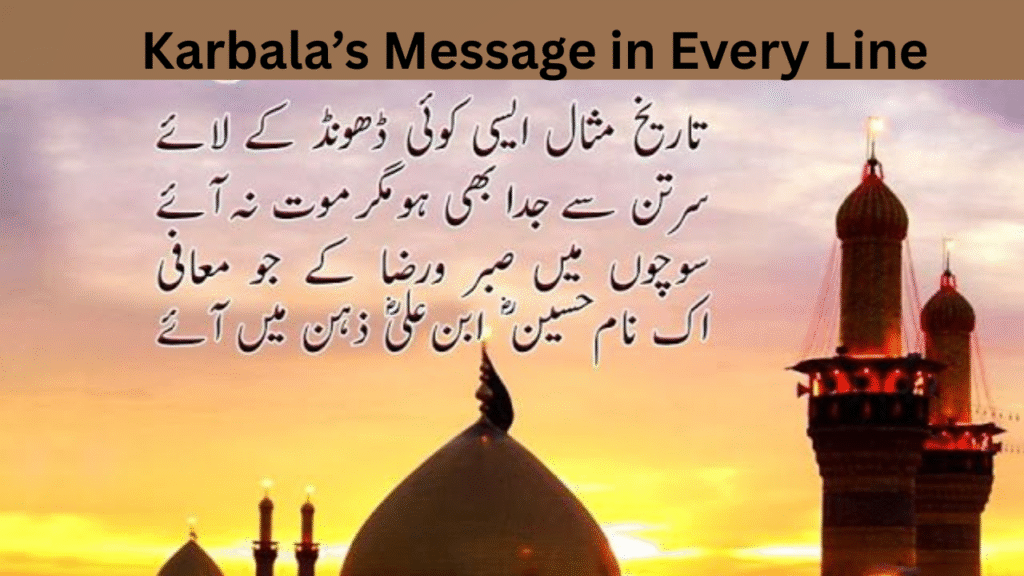
Karbala’s Message in Every Line
The main message of imam hussain poetry is universal. No matter the language or style, every poem says: stand up for truth, even if you’re alone. That’s why these poems are loved by people of all ages and backgrounds.
English Poetry:
“He gave his head but not his hand,
To tyrant king or cruel command.
He chose the desert, chose the pain,
So justice and faith would remain.”
Urdu Poetry:
“Jo jhuk gaya tha uska naam na raha,
Hussain jaisa koi Imam na raha.”
These poetic lines show why Imam Hussain’s memory never fades—because his stand for truth was timeless.
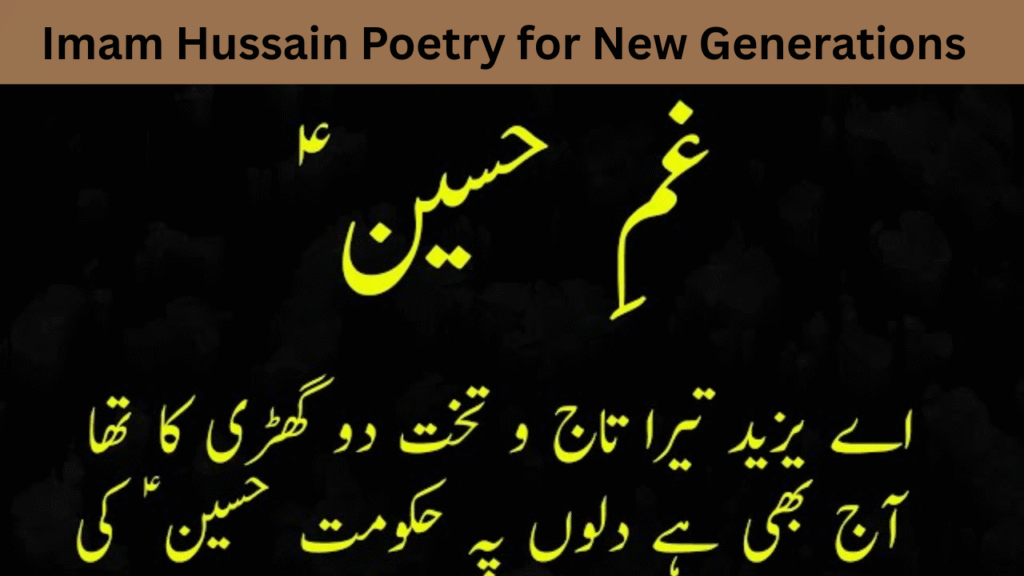
Imam Hussain Poetry for New Generations
Many schools now teach imam hussain poetry to help kids understand Islamic history in a creative way. Short rhymes, simple lines, and meaningful stories help children grow up with values of patience, kindness, and bravery.
Kids often recite:
“Hussain stood firm, so we could see,
What truth and love and faith should be.”
Through these poems, the lessons of Karbala live on in every generation.
Final Thoughts
Imam Hussain poetry is a spiritual, emotional, and educational bridge between the past and the present. It is not only written for mourning but for learning, remembering, and growing in faith.
Whether it’s a short verse or a long Marsiya, these poems touch hearts. They teach us that truth is worth more than life, and injustice must always be resisted.
So when you read or hear imam poetry, remember it’s not just poetry—it’s a call to the soul, a reminder to live with purpose and honor.
